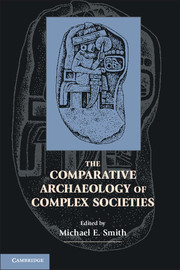Book contents
- Frontmatter
- Contents
- Tables
- Figures
- Contributors
- Foreword
- Preface
- Chapter 1 Comparative Archaeology
- Chapter 2 Approaches to Comparative Analysis in Archaeology
- Chapter 3 Comparative Frames for the Diachronic Analysis of Complex Societies
- Chapter 4 What It Takes to Get Complex
- Chapter 5 Challenges for Comparative Study of Early Complex Societies
- Chapter 6 Patterned Variation in Regional Trajectories of Community Growth
- Chapter 7 The Genesis of Monuments in Island Societies
- Chapter 8 Power and Legitimation
- Chapter 9 The Strategies of Provincials in Empires
- Chapter 10 Household Economies under the Aztec and Inka Empires
- Chapter 11 Low-Density, Agrarian-Based Urbanism
- Chapter 12 Archaeology, Early Complex Societies, and Comparative Social Science History
- Index
- References
Chapter 6 - Patterned Variation in Regional Trajectories of Community Growth
Published online by Cambridge University Press: 07 October 2011
- Frontmatter
- Contents
- Tables
- Figures
- Contributors
- Foreword
- Preface
- Chapter 1 Comparative Archaeology
- Chapter 2 Approaches to Comparative Analysis in Archaeology
- Chapter 3 Comparative Frames for the Diachronic Analysis of Complex Societies
- Chapter 4 What It Takes to Get Complex
- Chapter 5 Challenges for Comparative Study of Early Complex Societies
- Chapter 6 Patterned Variation in Regional Trajectories of Community Growth
- Chapter 7 The Genesis of Monuments in Island Societies
- Chapter 8 Power and Legitimation
- Chapter 9 The Strategies of Provincials in Empires
- Chapter 10 Household Economies under the Aztec and Inka Empires
- Chapter 11 Low-Density, Agrarian-Based Urbanism
- Chapter 12 Archaeology, Early Complex Societies, and Comparative Social Science History
- Index
- References
Summary
Societies in many regions all over the world started down the path toward large-scale social formations, so the number of trajectories available for comparative study is large. Although most of these regional trajectories are not well known, the few that are well enough documented for comparative study are more than comparisons can easily handle. A focus on early civilizations leads to comparing large world areas (Mesopotamia, Nile Valley, North China, Mesoamerica, Central Andes, etc.) because early civilizations are very large-scale social formations – finally, each of these world areas contained only one civilization. The beginnings of large social formations, which is the subject of this chapter, however, can be found in multiple separate regions within any of these areas. It is the specific trajectories of societal change within these smaller regions that we seek to compare, not culture-historical constructs like archaeological cultures, horizons, or traditions. For comparing trajectories, attention must be focused on human activities and the organization of social relationships in a place, and culture history is not the most effective or direct approach to these subjects. We treat each regional trajectory as a separate instance to be compared with others.
This chapter lays aside the data threads spun around differentiation in Chapter 5 in order to focus on those most directly connected to the emergence and growth of supra-local communities: local community structure, supra-local community scale, supra-local community centralization, demographic density, public works investment, tax rate, and conflict. Estimation of ancient populations and labor investment in public works lies at the core of the comparisons presented here. At least some archaeologists have long been willing to make such estimates, but the task should only be attempted by archaeologists willing to “dare to be inaccurate” (cf. Martens 2008:1160). Although the empirical basis for archaeological population and labor investment estimates is far better than it was twenty years ago, both still come with very wide error ranges. They can be put to effective use, but only if we adopt the attitude required for solving what have come to be called Fermi problems in the natural sciences, where the vital role played by quick calculations on cocktail napkins is thoroughly appreciated (Morrison 1963; Weinstein and Adam 2008). The comparisons we offer here are based on more rigorous use of empirical data than the solutions to Fermi problems often are, but the reader is forewarned that we have not let the imprecision of archaeological population or labor investment estimates stop us. We have been willing to work with sometimes uncomfortably large error ranges in order to see what kind of conclusions the best information now available leads toward. We offer them as cocktail napkin calculations; readers more interested in data precision than in the heuristic value of seeing where even imprecise data might lead should probably stop here. Those willing to join us in being as careful as possible with the data but riding roughshod when necessary, should read on. The sources of the empirical information we have used and the nature of our analyses are discussed in the appendix.
Information
- Type
- Chapter
- Information
- The Comparative Archaeology of Complex Societies , pp. 88 - 137Publisher: Cambridge University PressPrint publication year: 2011
References
Accessibility standard: Unknown
Why this information is here
This section outlines the accessibility features of this content - including support for screen readers, full keyboard navigation and high-contrast display options. This may not be relevant for you.Accessibility Information
- 11
- Cited by
